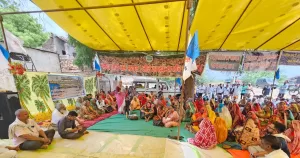Kalyani Menon Sen
All through this last fortnight, I have been getting a steady stream of text messages and mails – three or four a day – asking me to download the Aarogya Setu app and contribute to the national battle against Covid-19. The blurb says the app will proactively reach out to and inform users of risks, best practices and advisories on the coronavirus that causes the disease.
More than 60 million people have already downloaded the app. Many are pointing out bugs that need to be fixed. Strangely though, no one seems concerned about the fine print: the government can share your data with unspecified “other agencies” for unspecified “other purposes”. The app could potentially allow the government to peer into aspects of the user’s private life that have nothing to do with Covid-19.
The rate at which people are downloading the app suggests that they are not much bothered at the thought of the government keeping track of their movements and interactions with others. This insouciance is the outcome of a well-coordinated strategy to trivialise the notion of the right to privacy in the public imagination.
Aadhaar case
Recall the challenge in the Supreme Court to Aadhaar, the government’s project to give every Indian resident a 12-digit biometric-based unique identity number. The government first pooh-poohed the very idea of a right to privacy, then claimed that privacy was a concern only for the elite who did not realise that the poor were more concerned about the efficiencies in welfare delivery that the project would purportedly bring. Opponents of Aadhaar were mocked as “cheese-and-wine types” who did not care about the poor.
As the push for Aadhaar-linking broadened from food rations to bank accounts to mobile phones, the message morphed into tracking and punishing the corrupt. “Nothing to fear if you have nothing to hide,” was the reassuring mantra.
This message was repeated to justify the surveillance of activists, dissidents and public intellectuals. We were told that people who constantly criticise the government are only pretending to be good citizens while actually plotting the destruction of India. Planting snoopware onto mobile phones, hacking email accounts and using facial recognition technology was necessary for the defence of the nation.
Now Covid-19 has provided the decisive argument: “This is a life-and-death battle, so stop blathering on about privacy, just download this app and protect yourself.” And millions of people are dutifully complying.
Rights and freedoms
At each step, the public has been exhorted, encouraged and cajoled to forget that our Constitution assures us that our rights and freedoms are all equally sacrosanct – they cannot played off against each other. Instead, we have been tutored to understand rights in transactional terms: if you want this one, you have to give up that one.
This notion of rights as coins to be traded and bartered seems to have seeped into our most respected institutions. The majority judgement in the Aadhaar case agrees that if you want entitlements, you have to give up privacy. Supreme Court rulings on cases against the Citizenship Amendment Act convey a similar message: you are free to think that the act is dangerous, but you cannot put these thoughts out in public by writing or shouting slogans or posting on social media. In other words, if you want freedom of thought you have to give up freedom of expression. Otherwise, you will lose both – laws like the Unlawful Activities (Prevention) Act and the National Security Act can be deployed to divest people of their rights on the mere suspicion of being bad citizens.
As the state churns out these supposedly logical and rational arguments, they are amplified by “force multipliers” in the media and creatively marketed by the ecosystem of true believers, ensuring rapid percolation into the collective mind. The result is the rise of a public discourse that trivialises and undermines not just the right to privacy but the very idea of rights.
A trusty ally
Terror has always been a trusty ally of the state. It was the manufactured terror of losing their income tax Permanent Account Numbers that pushed a large number of people to enrol for Aadhaar. It was the imaginary spectre of violent terrorists that led the public to support surveillance of human rights activists. The Aarogya Setu app too capitalises on our terror of an invisible but deadly enemy. That’s enough for millions of Indians to hit the download button and click yes, yes, yes to all the permissions demanded in return for the illusory promise of protection.
The analysis of the state built up by activists and thinkers across the world who have turned a feminist lens on political processes in their own countries is now widely accepted. Alliances between corporate capital, nationalist ideologies and religious fundamentalists, brokered and held together by the glue of misogyny, have fed on the faultlines in our societies – gender, race, caste, religion, ethnicity, ableism et al – to give birth to the monstrous states we see today. These majoritarian, militaristic, authoritarian, centralising and all-controlling states are headed by “strongmen” who use the language and rituals of democracy to entice citizens into becoming willing devotees and loyal soldiers who will follow the leader’s diktats without hesitation and without question.
But let us not forget that the institution of the state has always been a reflection of the institution of the family. The compact between the state and the citizen replicates the terms of marriage: the more powerful entity pledges to provide the less powerful one with all the necessities for a safe, secure and dignified existence. In return, the less powerful party pledges to love, honour and obey without question.
Changing terms of compact
If you are a good wife or a good child or a good servant or a good employee – loving, respectful, obedient, tireless – you can enjoy the rights accorded to you by custom and by holy books. If you are a bad wife or a bad child or a bad servant – unloving, disrespectful, disobedient, unproductive – you will lose your rights and be punished for not deserving them.
Now replace “wife/child/servant” with “citizen” and “holy books” with “Constitution”. You have a working definition of governance.
But now our monster state has gone one step further and unilaterally changed the terms of its compact with the citizen, without reference to the Constitution or the shastras or customary practice or sanskar. Now rights are not a given, they must be earned. Rights are no longer ours by birth – they are rewards to be handed out to dutiful and obedient citizens who don’t ask questions and are willing to act as the eyes, ears and limbs of the state.
Good citizens are willing to keep an eye on their neighbours, eavesdrop on their conversations, stalk their friends and alert the state to any signs of disobedience or dissent. Good citizens are willing to come out on the streets with sticks and stones to deal out rough justice to enemies of the state – people who eat beef, people who vote for the wrong party, people who leave their lights on when good citizens switch off theirs. Those who do not perform these duties are then bad citizens by default. And of course bad citizens do not deserve rights.
Devaluing rights
This devaluing and erasure of rights has been facilitated and accelerated by a political ideology that pulls Constitutional values through the looking glass and morphs them into their polar opposites. Thus, dissent becomes treason. Freedom of belief and faith becomes jihad. Inclusion becomes appeasement. Questioning becomes sedition. Compassion becomes weakness. Coercion becomes discipline. Autocracy becomes decisiveness. Violence becomes tough love. And a snooping app becomes a tool for “digital immunity”.
Covid-19 is just the enabler for the latest leap in this journey, where each step is made easier by the last. We were already conditioned to the idea that some religious gatherings are holy while others are criminal. It is a small step to agree that people who contracted Covid-19 in the wrong sort of religious gathering deserve not treatment but imprisonment. We were already comfortable with prisoners being deprived of the right to vote. So why should we be perturbed if they are kept in jails without social distancing or protection? We were already fine with transgender sex workers being beaten and sexually abused by police, so we see nothing wrong if they are not being given food supplies or access to screening.
We agree that it is just and right to lynch beef eaters, so now if doctors refuse to test or treat the pregnant wives and daughters of this beef-eating lot, why should it bother us? We will happily bang pots and pans to salute these doctors, but we don’t turn a hair when they are forced to work in raincoats and helmets under threat of losing their jobs.
Despite these victories in its war on rights, the state becomes most insecure when faced with the idea of a right to privacy. The ability to maintain 360-degree surveillance is essential to sustain the image of the state as an all-seeing, all-knowing, all-powerful protector of the good and scourge of the less-than-good citizen. This is no different from the father or brother or lover or husband who demands access to your smartphone, your e-mail password, your bank account, your office files, your browsing history, your photo album – as proof of love, duty and loyalty.
We are already conditioned to obey when the state demands to know everything about us in the name of welfare, security, protection, rule of law. How can the state look after my interests and protect me if I hide myself from its gaze? And how can I prove that I love my leaders if I hide from them?
Feminist perspective
From my perspective as a feminist, the right to privacy rips apart this logic. It assures me that, regardless of love or duty, I can lay down my own boundaries to protect my wholeness, my autonomy and my identity as a human person. Far from being vague and difficult to conceptualise in real-life terms, privacy is located as obviously and firmly in my body as the right to life. My right to privacy is violated with every violation of my personhood, my dignity, my sense of self, my ways of living and loving.
When you force me to give my thumbprint to the Aadhaar database, spray me with bleach, insist that I download the Aarogya Setu app, bombard me with messages asking me to tune in to a particular radio programme, snoop on my phone calls, track my mails and map my movements – you are violating my right to privacy.
In a country where the body and persona of one individual stands as a symbol of the glory of the nation, it is effrontery for citizens to imagine that they can draw a boundary around their inconsequential personhood. And so privacy must be criminalised as the last refuge of the bad citizen.
As our parents and teachers used to say when they punished us, “Yes it hurts, but it’s for your own good – you should stop crying and thank us for it.”
(Kalyani Menon Sen is an independent researcher and feminist activist.)




